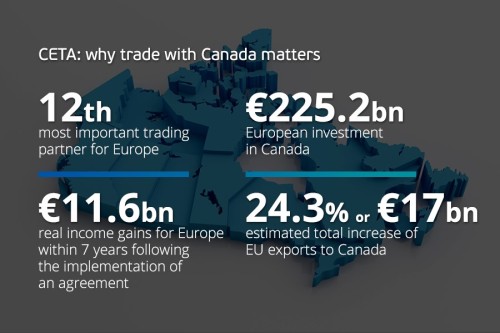As it stands, Ireland’s largest trading partner is the United Kingdom. This has been the case since Independence although the balance has shifted greatly since Ireland entered the EEC in 1973 with the UK no longer wholly dominant although our reliance for trade with the UK continues in certain sectors such as beef, timber, pork and much more.
As Ireland’s reliance on the UK as a trading partner has diminished, it has been able to look to a wider market largely thanks to membership of the EU both in terms of exporting to EU Member States as well as using EU trade deals to export to third parties.
Following the UK’s decision to leave the EU and the election of Donald Trump as President of the US with a far more protectionist outlook; Ireland must now use its EU membership to develop new markets and make the most of trade deals.
In the fourth of my series of articles, I thought I would look at opportunities for Ireland to do business with Canada, a country that is very familiar to many Irish people and one which offers the most pressing opportunities following the signing of the Comprehensive Economic Trade Agreement (CETA) this year.
Canada is a country I know well having spent a typical summer in Toronto as a student in 2003; working, making friends, playing rugby and seeing the wider country. Many of my friends emigrated from Ireland to Canada in the past decade, particularly to Vancouver and Toronto but also to some of the more provincial areas.

Relations between Ireland and Canada are close, based on family ties, cultural affinities and shared democratic political traditions. Over 4.4 million Canadians (or 14% of the population) claim some Irish ancestry, making the Irish the fourth-largest ethnic group in Canada. Diplomatic relations between Canada and Ireland were established in 1939. In recent years, shared values and interests have provided the basis for a further strengthening of the Canada-Ireland relationship, particularly in meeting the challenges of domestic and global governance. Canada Ireland trade is currently valued at €2.75 billion. Under CETA almost all tariffs on industrial goods between the EU and Canada will be eliminated with Ireland’s exports expected to grow by €250m.
The Ireland Canada Business Association was established to promote, develop and enable trade between Ireland and Canada. The ICBA has a strong Business Network which assists members in availing of business opportunities in both Ireland and Canada. The ICBA is built around its membership and promotes the interests of its members through lobbying, education and the provision of a programme of high calibre business events. The Patron of the Association is the Canadian Ambassador Kevin Vickers.
Canada-Ireland inter-parliamentary relations have been particularly active since March 1998. The Ireland-Canada inter-parliamentary group is the largest such entity in Canada’s Parliament. High-level visits and business missions traditionally constituted a key element in the Canada-Ireland relationship.
Following visits by Minister Coveney and Murphy in March, the Taoiseach will visit Canada this week where he will meet Prime Minister Trudeau in Montreal. They are expected to discuss the strong ties between the two countries and issues of mutual interest, including how to take advantage of opportunities created by the Canada-European Union Comprehensive Economic and Trade Agreement (CETA).

The recently agreed CETA deal effectively removes 98% of tariffs between Canada and the EU. CETA will lead to savings of just over half a billion euros in taxes for EU exporters every year, mutual recognition in regulated professions such as architects, accountants and engineers, and easier transfers of company staff and other professionals between the EU and Canada. CETA will create a more level playing field between Canada and the EU on intellectual property rights.
Ireland is currently the 5th largest recipient of Canadian outward investment. There are also more than 80 Canadian companies active in Ireland and 54 Irish companies operating in Canada. Over the past 10 years Ireland has doubled their exports to Canada and CETA will help grow these trade links even further.
The main benefits of CETA for Ireland include the opening up of public procurement markets in the Canadian provinces. This will give Irish firms increased access to Canadian public sector purchasing. Ireland will also gain unlimited tariff-free access for most of its important food exports.
It is in Ireland’s interest to see strong progress towards the implementation of the CETA as it will provide opportunities for Irish firms to diversify their export markets further. Total export and import trade between Ireland and Canada is worth €2.5 billion, which is based on 2014 trade results. That is a great deal of trade between the two countries and there are great opportunities to grow it further when the CETA is implemented.

The European Union is a strategic partner for Canada and the two share many common values. Their relationship is the EU’s oldest formal relationship with any industrialised country, officially dating back to 1959 when the two signed the Agreement for Cooperation in the Peaceful Uses of Atomic Energy. Today, the EU represents Canada’s second largest trade and investment partner and a natural ally on many foreign and security issues.
We will never have a better trading partner than the UK nor will we ever replace it’s preeminent role in Irish commerce but it is vital that we look to develop new markets and the obvious first ports of call must be those closest to home with the easiest levels of access.
Senator Neale Richmond is the Government spokesman on EU Affairs in Seanad Éireann.
Discover more from Slugger O'Toole
Subscribe to get the latest posts to your email.